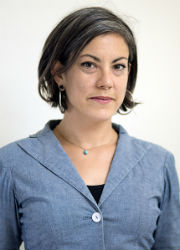Global Food Initiative
Sophie Moore
GFI Fellow - Class of 2015
Graduate Student, Cultural Studies
UC Davis
Project
Another World is Possible: Food Sovereignty, Agroecological Networks and Rural Development in Central Haiti
Description
While food aid and agricultural development organizations promote food security as a key component of rural development, food sovereignty - the right of a people to define their own food and agricultural systems - is more often associated with grassroots political groups like the Peasants’ Movement of Papaye (MPP). MPP’s farm school is this project’s ethnographic field site, where Haitian peasants are mobilizing around food sovereignty to address the multidimensional pressures of rural poverty.
View poster (PDF)
Goals
The goal of my dissertation research is to reveal MPP’s collaborative, transnational approach to agroecology as a community-led process of agrarian transition towards global food security. As such, this project pursues two main objectives: 1) to qualify and record the success of an existing model for food sovereignty through agroecology; and 2) to open institutional avenues for collaboration between the Northern academy and community groups in the south, with the intention of recording, disseminating and supporting smallholders’ science of local ecological knowledge.
My qualitative research examines how MPP members perceive and decide to act on environmental concerns affecting the global food system, how they locate their personal engagement with the principles of sustainable agriculture within MPP’s platform for social change, and how their daily agroecological practices contribute to food security at local and global scales. While the main dissertation fieldwork period will begin in July 2015, the UC GFI fellowship allowed me to conduct two weeks of preliminary field research in February 2015. My specific goal for this trip was to understand the actors in and key practices of MPP’s collaborative pedagogical network. MPP’s farm school, Sant Lakay, is a "living laboratory" for agroecology, serving both as the political nexus of the movement and an important site for smallholders’ exchange of scientific knowledge and mutual aid. In February, I conducted participant observation, guided field walks, and interviews at and around Sant Lakay, examining how the school and surrounding environment serve as a training site for agroecological theory and practice as well as for political mobilization around issues of rural environmental and social justice. The key goal of my February 2015 research trip was to obtain ethnographic and documentary data situating the farm school as a site of knowledge and resource exchange in support of an active movement towards food sovereignty at local and global scales. This preliminary fieldwork allowed me to gather ethnographic and documentary data revealing the organizational structure of MPP and its formal and popular education programs, including photographs, ethnographic description, movement documents and an interview with MPP’s leader.
Future plans
The GFI fellowship allowed me to conduct preliminary fieldwork towards my dissertation research project. The main fieldwork will take place between July 2015 and May 2016, during which time I will continue my cross-institutional collaboration with the UC Haiti Initiative, with a multicampus collective of political ecologists, and with a group of applied social scientists collecting agroecology curricula for and from La Via Campesina movements. I expect to complete the dissertation in spring 2018.
Mentors
Dissertation fieldwork supported by the Inter-American Foundation Grassroots Development Fellowship; mentors include Steve Temple, Diana Davis, Tobias Warner and Bettina Ng'weno

